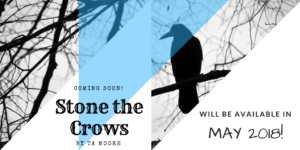Next month, on May 29th, my new book Stone the Crows will be available from Dreamspinner. It’s the sequel to Dog Days, my first book with Dreamspinner, and the first series that I’ve written. All of which is very exciting, but I got to tell you that book slaughtered me.
It wasn’t the writing, it was the self-doubt.
I’m not a cocky author by any means–although I do have my reaction to bad reviews pared down to an efficient five hours of rolling on the floor and wailing–but I am usually confident in the concept of what I want to write. If only because I’ve spent a few weeks relentlessly bending my friends ears with what I have planned and where it is going to go before I ever put finger to key. I’d done the same with Stone the Crows but…I just couldn’t shut up this irritating little whinge of self-doubt.
Not ‘what if no one likes it’, but ‘what if this isn’t as good as Dog Days’.
I started, deleted, restarted. I wrote it from different POVs, changed the plot, cannibalised the words I’d already written. At one point I’m pretty sure that my friends were one more ‘look at this first chapter’ away from locking me in a room.
In the end, though, I wrote it. So I thought I’d talk some about how I got myself over the hump, so to speak. Most of these techniques are the ones I use every time I have a bout of self-doubt, but I just needed to really commit to it this time.

1: People aren’t going to like it. There were people out there who don’t like Harry Potter, who think The Third Policeman isn’t a refreshing dip into whimsy, who don’t consume Rhys Ford books in one sitting while getting their hair done. No matter what you write, no matter how much blood, sweat, and tears you pour into it…there are going to people who hate. So you just have to accept that from the get.
2: You want a good first paragraph. It’s basically the foundation of the book and you need it grab the reader. However, it’s better to have twenty five solid chapters than a single, perfectly polished first chapter. I knew a guy who’d spent five years working on a book, but couldn’t get past revising and re-writing that first chapter. At some point you just have to let that first chapter have its way and push on. There will be an edit. There’s always an edit and you can fix it then.
3: Sometimes the words flow like the Awen itself has crowned you in glory. Your words could make poets weep or raise welts on a king’s face from your satire. Other days you sit and grind out words one at a time, for hours, and find all the joy of an ingrowing toenail in them. Usually, if you’re still trying, there’s not that much difference at the end of the day. I mean, yeah, sometimes you have veered off target for the book and need to course correct. Usually, though, the problem isn’t with the words it’s with you. It doesn’t show.
4: Coffee is your friend.
5: Tell the story you want to tell. Don’t worry about what other people want you to write or what people think is going to see. It’s not irrelevant, even if writing isn’t how you make your living we still want people to read our stuff, but it’s just a distraction. For me, at least. I cannot write something I don’t love and have faith in. If for no other reason than I’m a contrary cuss and if someone told me I should write about zookeepers and matchmaking otters I’d probably have the otters be alien murderers in disguise. I really do like adding ‘…in space!’ to things.
6: Just write. You’re never going to get anything done bookwise if you don’t.
Well, there we go. My rules for writing sequels, or any book. Hopefully it worked!
